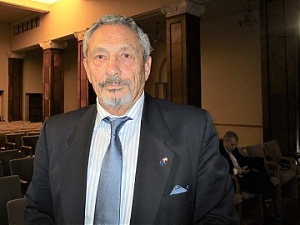Analytics, Ecology, EU – Baltic States, Modern EU
International Internet Magazine. Baltic States news & analytics
Wednesday, 24.12.2025, 15:53
EU’s “green deal”: changing power structures is needed
 Print version
Print version |
|---|
The attention to sustainability is high in the future
Commission’s agenda: even before being confirmed as the next president of the
European Commission, the former defense minister Ursula von Leyen promised to
introduce a “European Green Deal” within 100 days of her taking office. She even
managed to make a holistic vision for a sectoral economy’s transition aimed to
cut carbon emissions and reverse the European/global ecological breakdown,
while ensuring social justice and perspective growth.
According to Politicos’
comment, the decision requires a great power shift and review of competences’
division between the EU and the member states.
Reference to: Adler D., Wargan P*) in: https://www.politico.eu/article/ursula-von-der-leyens-green-deal-is-doomed-climate-change-european-commission/;
16.x. 2019.
Note: Pawel Wargan and David Adler are the coordinators
of the Green New Deal for Europe and members of the Democracy in Europe
Movement (DiEM25) governing board.
“Green agenda” is in the first place –out of six priorities-
in the new Commission’s President political agenda, i.e. “European green deal”,
with such components as climate-neutral targets up to 2050, emission trading
system, carbon border tax and energy taxation, to name a few.
On the draft for “GNDforEurope”
in: https://report.gndforeurope.com/cms/wp-content/uploads/2019/09/GNDE-A-Blueprint-for-Europes-Just-Transition.pdf
The Commission’s political agenda in: https://ec.europa.eu/commission/sites/beta-political/files/political-guidelines-next-commission_en.pdf
The EU’s decision-making level
The European Commission, which is the main EU institution
for drafting the EU socio-economic legislation and “administrating” the bloc’s policy,
sees certain difficulties in sharing sustainability competences among the EU
and the states.
Sustainability doesn’t fit into the already approved by the
Lisbon Treaty concept of “division of competences”, like numerous other
development spheres into exclusive, shared and supporting. For example, competition and international
treaties are exclusive, i.e. drafted only by the EU institutions, while
sectoral economy issues are almost all of shared nature and issues like
education, culture or industrial (!?) development are of supporting pattern.
In the same token, social policy is separated from trade
policy, finance –so far - from financing greenhouse gas reduction, and so on.
“In the best case, ambitious proposals end up in the hands of officials who are
sympathetic to the cause; in the worst, they reside with commissioners who are
determined to see them fail”, noted the Politico.
The new Commission President-elect has chosen the
center-left Dutch politician Frans Timmermans as the commissioner for a
"European Green Deal” and handed the portfolio “Economy that Works for
People” to the center-right politician, Valdis Dombrovskis.
Some agree that the political divide can serve as a
stumbling block on the way to tackling the “green deal” and socio-economic
solutions. Just one example: Timmermans would be in charge of “soft issues”
(e.g. new 2030 emission reduction target, zero-pollution decisions and circular
economy), while Mr. Dombrovskis’ portfolio includes some “hard issues”, such as
financing-related aspects of the green growth, sustainable transition,
transforming the European Investment Bank into a Union’s “climate bank”, as
well as a new financing strategy based on the issuance of green bonds. Besides,
he will coordinate the implementation of Commission’s EU Investment Plan, which
promises to “unlock” €1 trillion of investments over the next decade.
No doubt, the “green deal” is going to have in the perspective
a complicated agenda…
Political issues in the Commission
It seems that political divide is an important barrier to a
promising solution, as soon as, for example, Timmermans (as the center-left
representative) would coordinate the work of five directorates general (DGs),
most of which are led by center-right commissioners; whereas Dombrovskis (center-right)
would coordinate about four DGs, most of them led by center-left commissioners.
Still, however, jobs, cohesion, reforms and, crucially, economy – all is to be coordinated
by Mr. Dombrovskis rather than that of Mr. Timmermans.
Timmermans’ S&D allies in the Parliament are already
voicing concerns requiring “clarification on how exactly Mr. Dombrovskis would
cooperate” with other relevant commissioners in order to deliver on the
ambitious and progressive cross-sectorial set of policies including the “green new
deal”.
Presently, the Commission’s boss is taking the first steps
in her current plans for a “green deal”; there would be several others steps
needed to tackle Europe’s “twin issue” of economic growth, austerity, climate
change efforts, sustainability and environmental protection.
The Commission’s President would try to ensure a political
balance between the center left and the center right, while reinforcing the
latter’s supervision of portfolios essential for realizing the “green deal”
legislation.
However, present Commission’s structural and political
constraints are likely to produce a set of complicated problems needed urgent solutions,
though time is short and the member states need visible measures supported by
the EU’s policies.
Bottom-line: the EU institutions politico-economic process doesn’t
permit a holistic approach to sustainability; hence Von der Leyen’s Green Deal is
going to face enormous difficulties ahead.








 «The Baltic Course» Is Sold and Stays in Business!
«The Baltic Course» Is Sold and Stays in Business!

